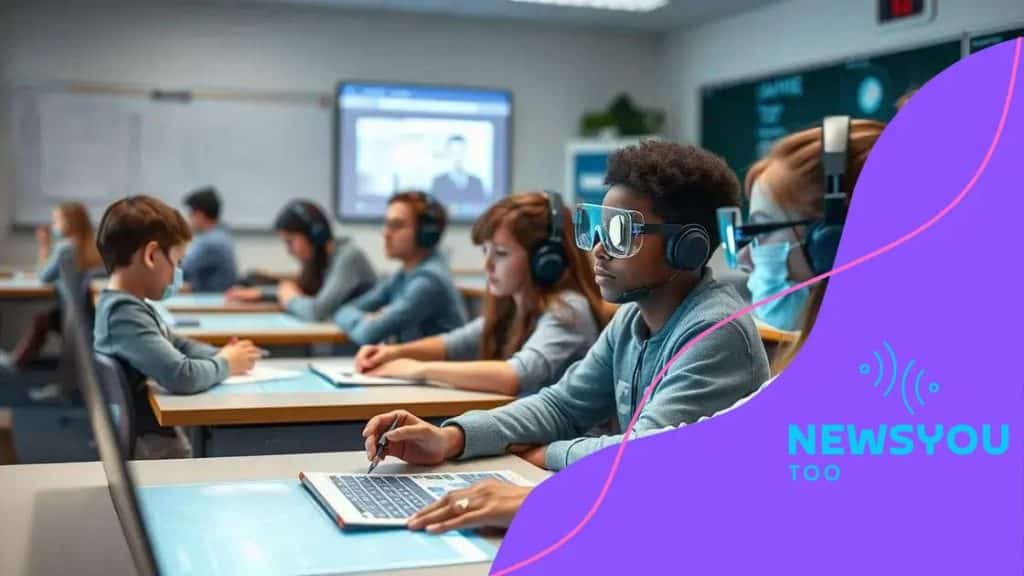How schools are using artificial intelligence for better outcomes

Anúncios
Schools are using artificial intelligence to enhance learning outcomes by personalizing education, improving teacher efficiency, and enabling data-driven insights while addressing ethical concerns such as data privacy and equity.
How schools are using artificial intelligence for better outcomes is an emerging topic that has sparked significant interest. Imagine a classroom where learning is tailored to each student’s needs! Let’s explore how educators are leveraging AI to transform the learning environment.
Anúncios
Overview of artificial intelligence in education
Artificial intelligence, often known as AI, is rapidly changing the landscape of education. This technology allows schools to create more dynamic learning environments tailored to individual student needs.
One key aspect of AI in education is its ability to enhance personalized learning. This means that lessons can adapt based on each student’s strengths and weaknesses. As a result, teachers can use tools that analyze student performance in real-time, providing immediate feedback and support.
Key Benefits of AI in Education
Using AI, schools can achieve several important outcomes:
Anúncios
- Improved access to educational resources.
- More efficient administrative processes.
- Increased student engagement.
- Enhanced assessment methods.
Another important benefit of AI is its role in assisting teachers. AI tools can help educators manage their workload more effectively. For example, grading can be automated, allowing teachers to focus more on teaching and less on paperwork.
Moreover, AI can also guide teachers in identifying students who may need additional support. Through data analysis, AI can highlight students at risk of falling behind, thus enabling timely interventions.
However, while there are many advantages, it’s vital that the use of AI in schools is approached with care. Ethical considerations must guide the integration of AI to ensure fair and responsible use.
Enhancing personalized learning experiences

Enhancing personalized learning experiences is at the forefront of many educational reforms today. With the help of artificial intelligence, schools can tailor lessons to meet the unique needs of each student.
By utilizing AI-driven platforms, educators can analyze data about student performance to provide customized materials. This allows students to learn at their own pace and in a way that suits their individual learning styles. Imagine a classroom where resources adjust based on how well each student grasps a topic!
Benefits of Personalized Learning
Implementing AI in personalized learning offers several key advantages:
- Adaptable learning resources that fit each student’s needs.
- Targeted feedback that helps students improve continuously.
- Increased motivation as students engage with tailored content.
- Better support for varied learning abilities in one classroom.
As AI gathers insights on individual student strengths and weaknesses, teachers can intervene more effectively. This means that when a student struggles, educators can offer additional resources or different methods to explain concepts. The result is a more supportive learning environment.
The power of AI also extends to lesson planning. Teachers can utilize AI tools to design engaging lessons that cater to different learning preferences, seamlessly integrating multimedia and interactive activities. This approach not only keeps students interested but also deepens their understanding of the material.
While the effectiveness of personalized learning is clear, it is essential that schools implement these technologies thoughtfully. Ensuring that the use of AI in education is equitable and ethical will help maintain a positive learning atmosphere for all students.
AI tools for improving teacher efficiency
AI tools have become a game-changer in improving teacher efficiency. These technologies streamline administrative tasks, allowing educators to focus more on teaching and less on paperwork.
For instance, AI can automate grading for multiple-choice tests and homework. This not only saves time but also provides immediate feedback to students, helping them learn more effectively. Imagine teachers spending less time on grading and more time engaging with their students!
Key AI Tools for Teachers
Some AI tools are specifically designed to boost teacher productivity:
- Grading software that evaluates assignments quickly.
- Communication platforms that automate parent-teacher updates.
- Lesson planning tools that suggest resources and activities based on learning goals.
- AI-based analytics that track student progress over time.
Using these tools enables teachers to manage their time better and creates an organized classroom environment. AI also assists in providing personalized resources, ensuring that every student receives the attention they need.
Moreover, AI can help identify learning patterns and flag students who may need additional support. This timely insight enables educators to address issues before they escalate, promoting a healthier learning experience.
As teachers embrace AI technologies, they can foster a more interactive and engaging classroom. Enhanced efficiency not only benefits teachers but also enriches the students’ learning journey.
Data analytics and student performance tracking

Data analytics plays a crucial role in student performance tracking. By leveraging AI technologies, schools can gain valuable insights into how students are progressing.
With the help of data analytics, educators can identify trends in student performance. This means they can see which subjects students excel in and where they may struggle. Imagine teachers having an easy way to understand how to help each student succeed!
Benefits of Data Analytics in Education
Using data analytics in educational settings offers several important advantages:
- Early identification of students who need extra help.
- Enhanced decision-making based on concrete, actionable insights.
- Personalized learning experiences that cater to individual needs.
- Improved resource allocation for better educational outcomes.
By continually monitoring data, teachers can tweak their teaching methods and materials to fit their students’ needs. This ensures that interventions can take place before issues become significant. With real-time feedback, educators can adjust lessons and provide additional support as necessary.
Moreover, data analytics can help in measuring the effectiveness of different teaching strategies. By analyzing performance data after implementing a new approach, schools can determine what works best for their students.
However, it’s important to ensure that data is used ethically. Protecting student privacy while using data to improve learning outcomes is essential. This responsible approach helps build trust with students and parents alike.
Ethical considerations in using AI in schools
Ethical considerations are crucial when it comes to using AI in schools. As technology advances, it’s essential to think about how these innovations affect students, teachers, and the educational environment.
One key ethical concern is data privacy. Schools collect a lot of data on students to personalize learning experiences. However, it’s vital to ensure that this data is protected and used responsibly. Parents and students should feel confident that their information isn’t misused.
Important Ethical Factors to Consider
When implementing AI in education, several factors must be taken into account:
- Ensuring transparency in how data is collected and used.
- Preventing bias in AI algorithms that could affect student evaluations.
- Maintaining a balance between technology usage and human interaction.
- Creating guidelines for equitable access to AI tools for all students.
Moreover, AI can sometimes reinforce existing prejudices if not designed carefully. It’s important for educators and developers to be aware of this risk. By regularly reviewing AI tools, schools can help prevent these biases from impacting students’ learning outcomes.
There is also a need for ongoing training for teachers on how to use AI ethically. Educators should understand the limits and capabilities of AI tools, able to recognize when a human touch is needed in the learning process.
In considering these ethical aspects, schools can foster a more inclusive and fair educational environment. This commitment can help build trust within the school community and promote positive outcomes for all students.
FAQ – Frequently Asked Questions about AI in Education
How can AI improve student learning outcomes?
AI personalizes educational experiences by adapting lessons to meet individual student needs based on their strengths and weaknesses.
What are the ethical concerns related to AI in schools?
Ethical concerns include data privacy, preventing bias in algorithms, and ensuring equitable access to AI tools for all students.
How do AI tools enhance teacher efficiency?
AI tools automate administrative tasks like grading and scheduling, allowing teachers to focus more on instruction and student engagement.
Why is data privacy important in the use of AI in education?
Data privacy is crucial to protect student information from misuse and to build trust among students and their families.





